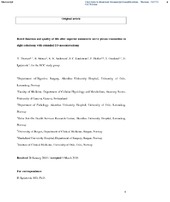Bowel function and quality of life after superior mesenteric nerve plexus transection in right colectomy with D3 extended mesenterectomy
Thorsen, Yngve; Stimec, Bojan V.; Andersen, Solveig Norheim; Lindstrøm, Jonas Christoffer; Pfeffer, Frank; Øresland, Tom; Ignjatovic, Dejan; RCC Study Group
Peer reviewed, Journal article
Accepted version
Permanent lenke
https://hdl.handle.net/1956/17707Utgivelsesdato
2016Metadata
Vis full innførselSamlinger
Originalversjon
https://doi.org/10.1007/s10151-016-1466-ySammendrag
Background: The aim of this study was to ascertain the impact of injury to the superior mesenteric nerve plexus caused by right colectomy with D3 extended mesenterectomy as performed in the prospective multicenter trial: “Safe Radical D3 Right Hemicolectomy for Cancer through Preoperative Biphasic Multi-detector Computed Tomography” in which all soft tissue surrounding the superior mesenteric vessels from the level of the middle colic artery to that of the ileocolic artery was removed. Methods: Bowel function and gastrointestinal quality of life in two consecutive cohorts that underwent right colectomy with and without D3 extended mesenterectomy were compared. Main outcome measures were the Diarrhea Assessment Scale (DAS) and Gastrointestinal Quality of Life Index (GIQLI). The data were collected prospectively through telephone interviews. Results: Forty-nine patients per group, comparable for age, sex, length of bowel resected but with significantly shorter follow-up time in the experimental group, were included. There was no difference in total DAS scores, subscores or additional questions except for higher bowel frequency scores in the D3 group (p = 0.02). Comparison of total GIQLI scores and subscales showed no difference between groups. Regression analysis with correction for confounding factors showed 0.48 lower bowel frequency scores in the D2 group (p = 0.022). Within the D3 group presence of jejunal arteries cranial to the D3 dissection area showed 1.78 lower DAS scores and 0.7 lower bowel frequency scores. Conclusions: Small bowel denervation after right colectomy with D3 extended mesenterectomy leads to increased bowel frequency but does not impact gastrointestinal quality of life. Individual anatomical variants can affect postoperative bowel function differently despite standardized surgery.
